1. Characteristics of Yin Deficiency Constitution
The body tends to be thin, with a deficiency of Yin fluids, primarily characterized by symptoms of internal heat such as dry mouth, dry throat, and heat in the palms and soles. Common manifestations include heat in the palms and soles, flushed complexion, dry mouth and throat, insomnia, dry stools, yellow urine, intolerance to spring and summer, preference for cold drinks, thin and rapid pulse, and a red tongue with little coating.
Individuals with this constitution are more tolerant of cold environments but less tolerant of heat, dryness, and external pathogens, which can easily transform into heat.
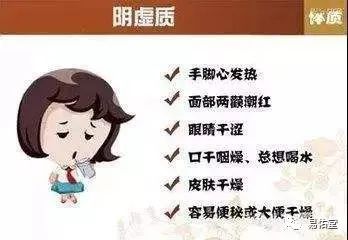
2. Causes of Yin Deficiency Constitution
Yin deficiency constitution often arises from congenital insufficiency, prolonged illness with blood loss, excessive sexual activity, and overwork damaging Yin. Family members may tend to be thin, and factors such as weak parents during conception, advanced maternal age, premature birth, or previous hemorrhagic diseases can contribute.
The famous physician Zhu Danxi from the Yuan Dynasty, a founder of the Nourishing Yin school, believed that a child’s constitution is primarily derived from congenital factors and closely related to breastfeeding. In his work “Ge Zhi Yu Lun,” he recorded that his second daughter, who was thin and irritable with inherent heat, was prescribed herbal medicine to nourish Yin and reduce fire. However, she failed to persist with the treatment, and by the age of two, her child developed sores all over, indicating a close relationship between constitution and prenatal transmission.
Additionally, excessive fatigue, prolonged nights, dietary preferences, and overindulgence in sexual activity are key factors in developing Yin deficiency constitution. Nature has its own rhythms: spring is for growth, summer for flourishing, autumn for harvest, and winter for storage. The human body also has its biological clock, working during the day and resting at night. However, modern individuals often wish to stretch 24 hours into 48 or 72 hours, waking up to eat, study, play sports, read, listen to music, and conduct business, only to continue at night with either all-night work or nightlife under neon lights, unaware that no one can work indefinitely without rest. Overindulgence in rich, fatty, and heat-inducing foods can also lead to Yin deficiency, as these foods can generate heat and harm Yin fluids. Excessive sexual activity is another significant cause of Yin deficiency; if one feels fatigued, has dark circles under the eyes, dry mouth, and heat in the palms and soles for many days after sexual activity, it may indicate a state of Yin deficiency.
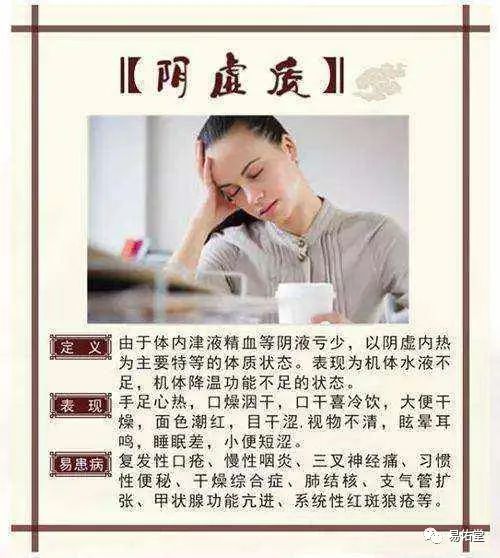
The body’s fluids, essence, and blood all belong to the category of Yin. In nature, the sun provides energy, while water serves as the material basis for nourishment, nurturing the world. Without water, rivers dry up, boats cannot navigate, surrounding land cracks, and plants wither and die. The human body is a microcosm of nature; a person can survive without food for 7-10 days, but without water, they may not last three days. When water and fluids are scarce, the mouth becomes dry. If the large intestine lacks moisture, constipation may occur, leading to anal fissures and hemorrhoids, while dry skin can lead to flaking and wrinkles.
Yin and Yang are the principles of the Dao; under normal circumstances, the balance between Yin and Yang should be stable. If Yin substances are deficient, the Yang aspects will appear relatively vigorous, leading to a phenomenon of internal heat disturbance. This results in flushed cheeks, heat in the palms and soles, heightened spirit, irritability, and a tendency to anger. Such individuals may appear healthy and energetic, but they are actually in a deficient state that cannot withstand repeated strain.
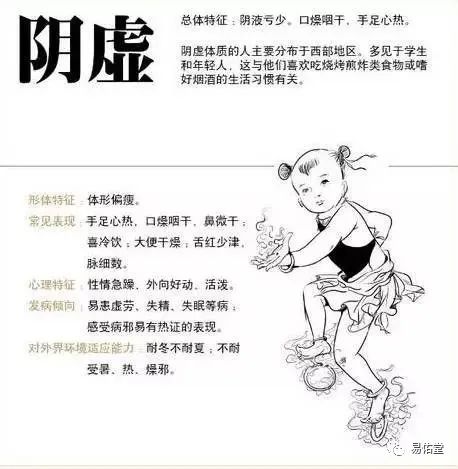
3. Disease Tendencies
Individuals with a Yin deficiency constitution are prone to conditions such as internal heat, fatigue, diabetes, loss of essence, insomnia, lung cancer, and breast cancer.
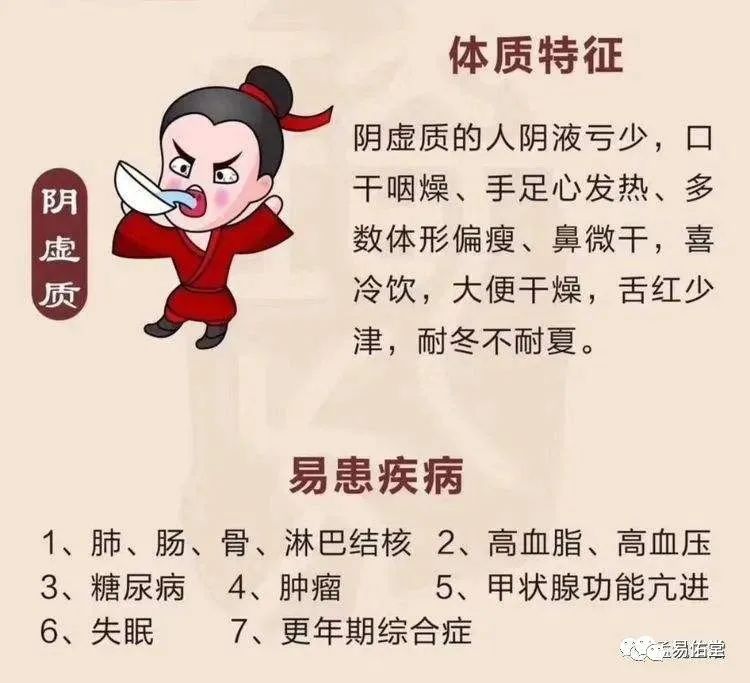
4. Health Preservation and Regulation
1. Mental Regulation. Individuals with a Yin deficiency constitution tend to be irritable and easily angered due to excessive internal heat disturbing the spirit. They should follow the principles of “calmness and emptiness” and “guarding the spirit within” from the Inner Canon. It is essential to cultivate self-discipline, read self-improvement literature, and develop habits of calmness and composure. In daily life and work, avoid unnecessary arguments over trivial matters to reduce irritability, and limit participation in competitive recreational activities. Additionally, moderation in sexual activity is crucial.
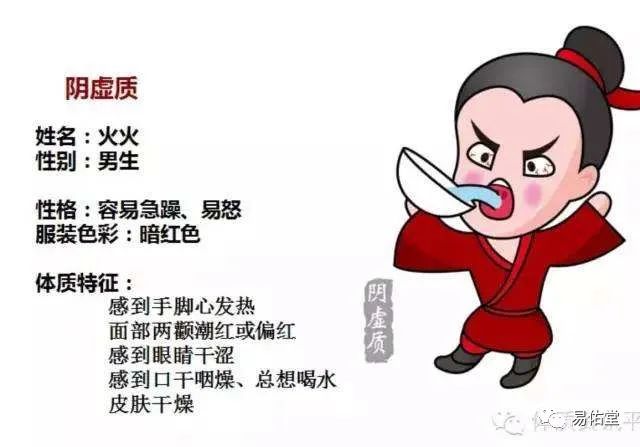
2. Environmental Regulation. Those with Yin deficiency often experience heat in the palms and soles, dry mouth and throat, and have a preference for coolness while being intolerant to heat. Therefore, during hot summers, it is important to avoid heat and, if possible, travel to cooler places such as the seaside or mountains. Nourishing Yin during autumn and winter is particularly important for those with Yin deficiency, especially in autumn when the climate is dry and can easily harm Yin. The living environment should be quiet, preferably in a house facing south.
3. Dietary Regulation. The principle of dietary regulation is to nourish Yin and subdue Yang. It is advisable to consume more light foods such as sesame, glutinous rice, honey, dairy products, sugarcane, vegetables, fruits, tofu, and fish. Special attention should be given to congee made with Sha Shen (Adenophora), Bai He (Lily Bulb), Gou Qi Zi (Goji Berries), Sang Shen (Mulberries), and Shan Yao (Chinese Yam). If conditions allow, ingredients like bird’s nest, white fungus, sea cucumber, turtle meat, crab meat, Cordyceps, and old male duck can be used. Spicy and heating foods such as scallions, ginger, garlic, leeks, chives, and chili peppers should be consumed sparingly.
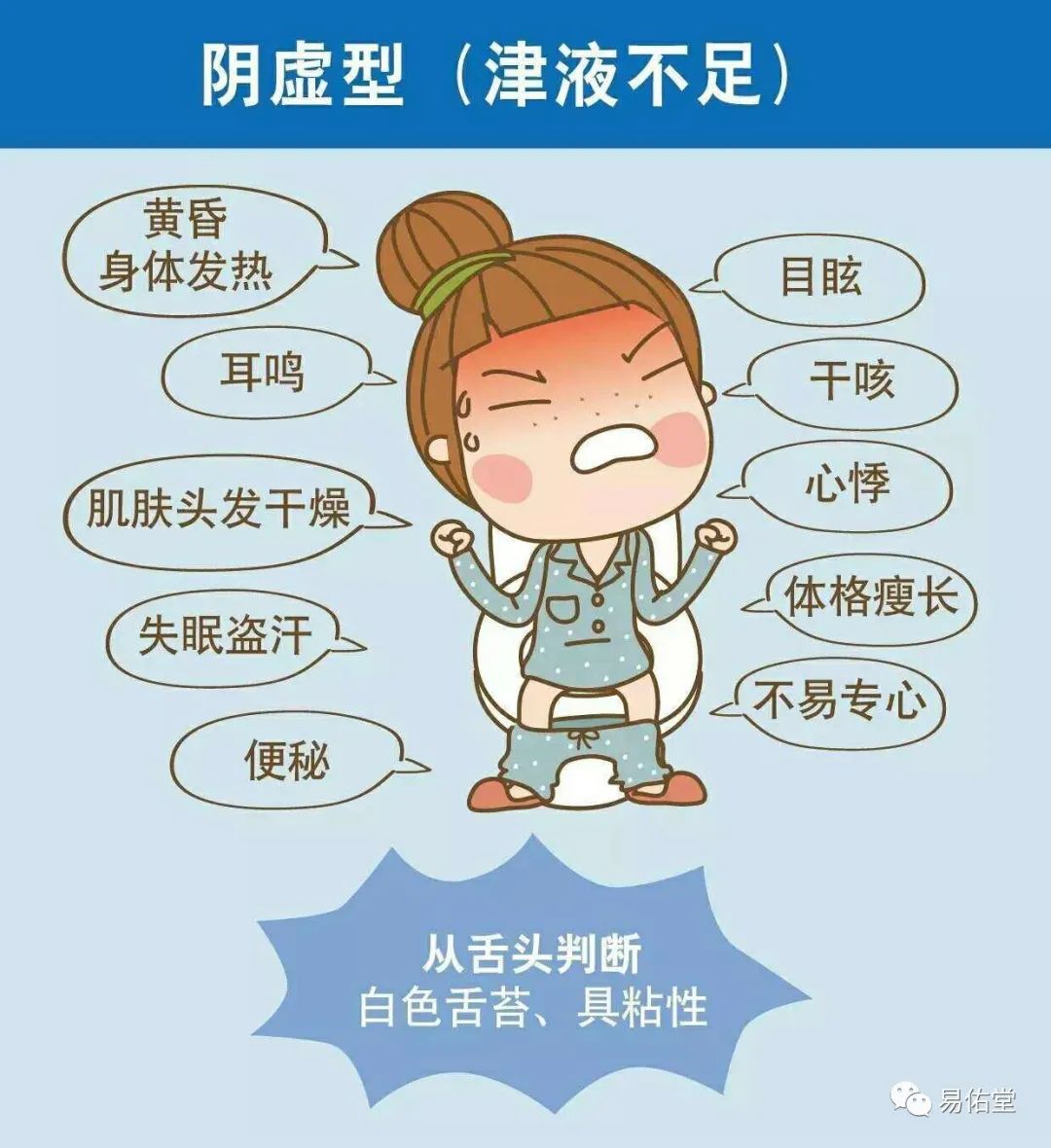
4. Herbal Regulation. One can choose herbs that nourish Yin and clear heat, as well as nourish the liver and kidneys. Suitable herbs include Nu Zhen Zi (Ligustrum), Shan Zhu Yu (Cornus), Wu Wei Zi (Schisandra), Han Lian Cao (Eclipta), Mai Men Dong (Ophiopogon), Tian Men Dong (Asparagus), Huang Jing (Polygonatum), Yu Zhu (Polygonatum), Xuan Shen (Scrophularia), Gou Qi Zi (Goji Berries), Sang Shen (Mulberries), and Gui Ban (Tortoise Shell). Commonly used herbal formulas include Liu Wei Di Huang Wan (Six-Ingredient Rehmannia Pill) and Da Bu Yin Wan (Great Tonifying Yin Pill). For those with Yin deficiency, it is important to differentiate between kidney Yin deficiency, lung Yin deficiency, and heart Yin deficiency for appropriate regulation.
Herbal dishes such as lotus seed and lily bulb soup with lean meat can clear the heart, moisten the lungs, and calm the spirit; honey-steamed lily bulb can nourish the lungs, moisten dryness, and clear heat.
5. Physical Exercise. Avoid excessive activities and focus on nourishing liver and kidney functions. Tai Chi, Ba Duan Jin (Eight Pieces of Brocade), internal exercises, and Qigong should emphasize techniques that consolidate essence and promote health, particularly those that focus on nourishing fluids.
